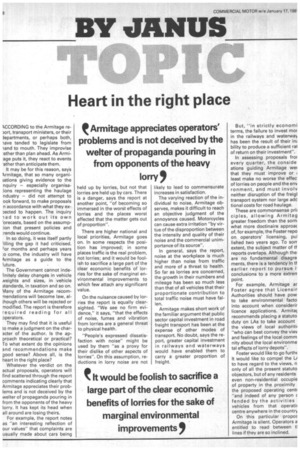Heart in the right place
Page 70

If you've noticed an error in this article please click here to report it so we can fix it.
Armitage appreciates operators problems and is not deceived by the welter of propaganda pouring in from opponents of the heavy
lorry 9 \CCORDING to the Armitage reNort, transport ministers, or their lepartments, or perhaps both, lave tended to legislate from land to mouth. They improvise .ather than plan ahead. As Armiage puts it, they react to events .ather than anticipate them.
It may be for this reason, says
rmitage, that so many organi3ations giving evidence to the nquiry — especially organisaions representing the haulage ndustry — did not attempt to ook forward, to make proposals n accordance with what they exJected to happen. The inquiry -lad to work out its own 'orecasts, based on the assump:ion that present policies and :rends would continue.
In so doing, it was itself partly 'Ming the gap it had criticised. =or months and perhaps years :o come, the industry will have r\rmitage as a guide to the ruture.
The Government cannot inde'initely delay changes in vehicle A/eights and sizes, in vehicle 3tandards, in taxation and so on. Many of the Armitage recommendations will become law, although others will be rejected or modified. The report is therefore required reading for all operators.
They may find that it is useful to make a judgment on the character of the author. Is the approach theoretical or practical? To what extent do the opinions and recommendations make good sense? Above all, is the heart in the right place?
Whatever the verdict on the actual proposals, operators will find scattered through the report comments indicating clearly that Armitage appreciates their problems and is not deceived by the welter of propaganda pouring in from the opponents of the heavy lorry. It has kept its head when all around are losing theirs.
For example, the report notes as "an interesting reflection of our values" that complaints are usually made about cars being held up by lorries, but not that lorries are held up by cars. There is a danger, says the report at another point, "of becoming so immersed in the worst effects of lorries and the places worst affected that the matter gets out of proportion".
There are higher national and local priorities, Armitage goes on. In some respects the position has improved; in some places traffic is the real problem, not lorries; and it would be foolish to sacrifice a large part of the clear economic benefits of lorries for the sake of marginal environmental improvements to which few attach any significant value.
On the nuisance caused by lorries the report is equally clearsighted. "We see no firm evidence," it says, "that the effects of noise, fumes and vibration from lorries are a general threat to physical health.
"People's expressed dissatisfaction with noise" might be used by them "as a proxy for their dislike of other aspects of lorries". On this assumption, reductions in lorry noise are not likely to lead to commensurate increases in satisfaction.
The varying reaction of the individual to noise, Armitage observes, makes it difficult to reach an objective judgment of the annoyance caused. Motorcycles can cause extra irritation "by virtue of the disproportion between the intensity and quality of their noise and the commercial unimportance of its source".
In general, says the report, noise at the workplace is much higher than noise from traffic and more of a threat to health. So far as lorries are concerned, the growth in their numbers and mileage has been so much less than that of all vehicles that their proportionate contribution to total traffic noise must have fallen.
Armitage makes short work of the familiar argument that public sector capital investment in road freight transport has been at the expense of other modes of transport. No doubt, says the report, greater capital investment in railways and waterways would have enabled them to carry a greater proportion of freight.
But, —in strictly economi terms, the failure to invest mor in the railways and waterway has been the result of their int bility to produce a sufficient rat of return on their investment".
In assessing proposals fror every quarter, the conside ations guiding Armitage wet that they must improve or least make no worse the effec. of lorries on people and the env ronment, and must involv neither disruption of the freigl transport system nor large adc tional costs for road haulage.
These are commonsense prii ciples, allowing Armitag greater freedom than the som, what more doctinaire approac of, for example, the Foster repo on operators' licensing, pul lished two years ago. To sonextent, the subject matter of reports overlaps. Although the are no fundamental disagre ments, there is a tendency in tlearlier report to pursue i conclusions to a more extrerr point.
For example, Armitage or Foster agree that Licensir Authorities should have pow to take environmental facto into account when considerir licence applications. Armitac recommends placing a statuto duty on LAs to take account the views of local authoritil "who can best convey the viev and feelings of the local comm nity about the local environme tal effects of lorry depots".
Foster would like to go furthE It would like to compel the 1_, to have regard to the views, n only of all the present statuto objectors, but of any residents even non-residential occupie of property in the proximity the proposed operating centr "and indeed of any person c fended by the activities vehicles from that operatir centre anywhere in the country On this particular propoE Armitage is silent. Operators a entitled to read between tl lines if they are so inclined.












































































































